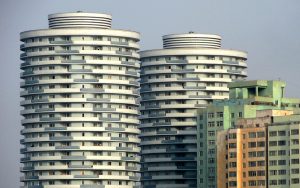Many North Koreans are experiencing financial difficulties because of COVID-19, and even the country’s wealthy are suffering from the downturn in the economy, Daily NK has learned.
“Even donjuLiterally "masters of money," donju refers to people who hav... More who live in apartments worth tens of thousands of dollars are firing their housekeepers or making drastic cuts to their pay,” a source in South Pyongan Province told Daily NK last Wednesday, using a term to describe North Korea’s wealthy entrepreneurial class. “Some donjuLiterally "masters of money," donju refers to people who hav... More used to boast that ‘even if the Taedong River dries up, my pockets never will.’ But even they have had to let their housekeepers go.”
DonjuLiterally "masters of money," donju refers to people who hav... More accumulate capital through trade and business activities. However, because the flow of money has been restricted by the COVID-19 border blockade, they have had to reduce their spending.
“DonjuLiterally "masters of money," donju refers to people who hav... More used to pay housekeepers KPW 100,000 to KPW 150,000 [around USD 15 to 22] each month to do chores like cooking, laundry, cleaning, and taking care of their pets. However, as the COVID-19 situation continued to worsen, they have had to tighten their belts.
“Many donjuLiterally "masters of money," donju refers to people who hav... More are cutting housekeepers’ salaries in half or even firing them, saying that there is ‘no business and no money,” the source further explained. “It’s not just regular people that are having a hard time – it’s the donjuLiterally "masters of money," donju refers to people who hav... More, too.”
The economic situation in North Korea appears to have worsened to the extent that even donjuLiterally "masters of money," donju refers to people who hav... More, many of whom have accumulated a significant amount of capital in recent years, are having to cut down on spending.

North Korea shut down its border and halted nearly all trade when China was in the throes of its COVID-19 outbreak. This cut off the donjuLiterally "masters of money," donju refers to people who hav... Mores’ main source of income.
According to the General Administration of Customs of China, the volume of trade between China and North Korea was worth USD 539,059,000 last year. North Korea imported USD 491,059,000 of goods from China that year. Both the total volume of trade and the value of Chinese imports into North Korea have been reduced by approximately 81% compared to the previous year.
Trade between North Korea and China has been hit particularly hard. North Korean imports to China only amounted to approximately USD 3,000 last month.
The virtual suspension of trade has contracted North Korea’s markets, caused inflation, and a decrease in household income. As the market has shrunk, donjuLiterally "masters of money," donju refers to people who hav... More have also suffered economic blows.
DonjuLiterally "masters of money," donju refers to people who hav... More have an outsize influence on the North Korean economy due to their large accumulations of capital. If their capital reserves run out, it is likely to have a significant impact on the North Korean economy.
Despite this, while donjuLiterally "masters of money," donju refers to people who hav... More are tightening their belts due to the country’s temporary financial difficulties, they are still not concerned about maintaining their livelihoods.
On the other hand, regular people are experiencing a major financial crisis due to the difficulties caused by COVID-19.
The prices of various food items and daily necessities have skyrocketed and shown signs of instability due to the lack of supply. For instance, pork prices in North Korea have increased by approximately 57% over the past six months.
The prices of popular street foods such as soybean injogogi (fake meat), dububap (tofu rice), and rice cakes are increasing while portion sizes are decreasing.
Most North Koreans are suffering from financial difficulties, but based on reports Daily NK receives from inside the country, average citizens seem to be having an even harder time than those with financial means at their disposal.
*Translated by S & J

















